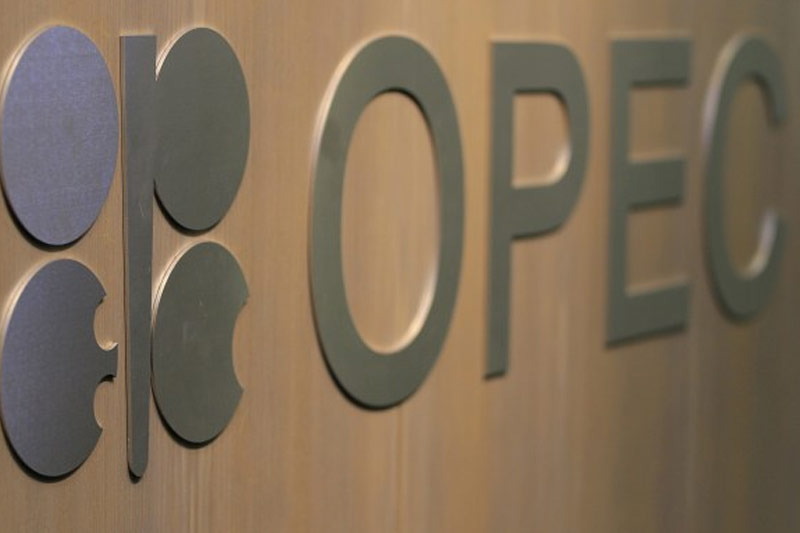How are energy investors positioned?
(Bloomberg) -- Saudi Arabia, the dominant force in OPEC, is using both stick and carrot to talk other members of the oil cartel into defending prices at Thursday’s ministerial meeting.
Saudi Oil Minister Prince Abdulaziz bin Salman, in Vienna for his first meeting since taking the top job, is willing to raise production slightly if other countries keep failing to meet their existing output target, according to OPEC delegates. The potential reward for complying: Riyadh will lead the way in deepening curbs.
The outcome of the meeting remained open on Wednesday evening as OPEC officials shuttled between sit-downs in the suites of luxury hotels. The precise terms of any proposed deal were unclear. Iraq, the country with the poorest track record complying with the pact, had talked about a production cut of 400,000 barrels a day, but later on Wednesday the minister said instead he favored an extension of the current plan, which expires in March 2020, until the end of next year.
For the oil market, a new deal would be a psychological boost as traders fret about possible oversupply next year, but may take relatively few barrels out of the physical market. Saudi Arabia has already been pumping significantly below its official OPEC level, and few are likely to believe that nations such as Iraq, Nigeria or even Russia, which haven’t complied with the deal so far this year, are about to start.
”The Kingdom has explicitly communicated to OPEC that it will no longer tolerate under-compliance and that if it continues, Saudi Arabia can easily return to producing at or above its current quota,” said Amrita Sen, chief oil analyst at Energy Aspects Ltd.
The so-called OPEC+ alliance has an agreement to reduce output by about 1.2 million barrels a day since the start of the year in order to eliminate a surplus and bolster crude prices.
Next year’s oil market could prove tricky. Demand growth is slowing and another big expansion in rival production is coming down the pipeline. Together those factors could create another oversupply that drives international prices back down toward $50 a barrel.
That’s too low for most OPEC members to balance their budgets, and would make an unfortunate epilogue for the record-breaking initial public offering of Saudi Arabia’s state oil company, Aramco.
Still, prior to this week, the vast majority of analysts and traders surveyed by Bloomberg considered an extension at current production levels to be the most likely outcome. Iraq’s abortive push for a bolder move fanned speculation that the cartel could have a surprise in store.
Brent crude advanced $2.19 to $63 a barrel as of 8:48 p.m. in London.
Skeptical Reaction
Iraq’s status as an unlikely advocate for deeper cuts -- it has actually increased production since last year’s agreement -- prompted some skepticism about whether a genuine supply reduction was imminent.
“As is often the case with OPEC, one has to incorporate a fair degree of psephology to see what’s going on behind the headlines,” analysts at Redburn Ltd. said in a note. The additional 400,000 barrel-a-day reduction proposed by Iraq “would actually leave physical production broadly unchanged” because the group is already pumping less than its official target.
Prince Abdulaziz offered little clarity when he arrived in Vienna on Wednesday morning. He declined to answer specific questions when he arrived in the city, saying simply that the market outlook was “sunny” like the weather.
United Arab Emirates Energy Minister Suhail Al Mazrouei wouldn’t confirm which proposals will be discussed, while Kuwait’s Oil Minister Khaled Al-Fadhel said he hadn’t heard a suggestion for an additional cut of 400,000 barrels a day. Russian Energy Minister Alexander Novak is due to arrive in Vienna Thursday morning.
In reality, OPEC+ has already gone deeper than the agreed 1.2 million reduction due to a combination of voluntary and involuntary measures. The group’s Joint Technical Committee concluded that cuts exceeded that target by about 40% in October, meaning the additional curbs Iraq is proposing are actually in place, albeit unofficially.
Saudi Arabia, wishing to lead by example, has pumped well below its quota for the duration of the agreement. Other nations including Angola, Venezuela and Mexico have simply been unable to sustain their production due to industry mismanagement, sanctions or years of under-investment.
The kingdom’s extra efforts have offset lax implementation of output reductions by several other nations. On average this year, Russia has implemented just 72% of its pledged cuts, while Nigeria and Iraq have actually increased output, according to data from the International Energy Agency.
“Saudi Arabia could easily reduce its official production allowance by 300,000 barrels a day without affecting its actual production,” said Olivier Jakob, managing director of consultant Petromatrix Gmbh, which is based in Zug, Switzerland. “A cosmetic cut might feed some automated buying on headlines, but that would be a rally hard to sustain.”
